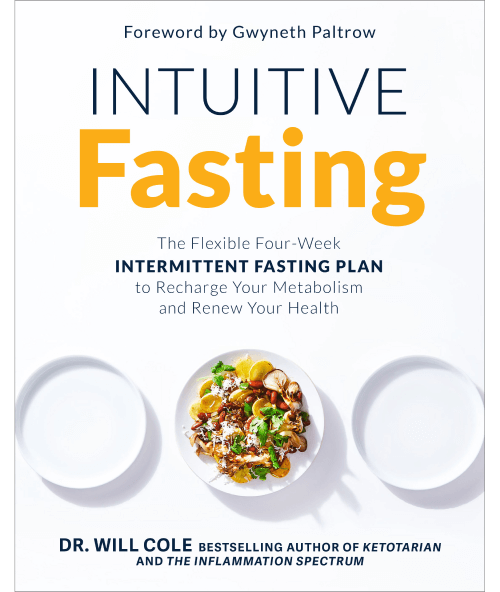[ad_1]

When functional medicine practitioner Will Cole introduces his patients to intermittent fasting, one of
the first questions they typically ask is: Is it okay to drink coffee during my fasting period?
Us, too. Thankfully, Cole answers those questions and more in his latest book, Intuitive
Fasting, which is out this week from goop Press. His clear, flexible four-week program includes meal
plans, recipes, and daily eating schedules. And it is also a wonderful education on the most
effective ways to fast
and which foods to eat when in order to amplify the benefits of intermittent fasting. Throughout the book, Cole
shares holistic strategies for reducing inflammation, recharging your metabolism, and resetting gut health.
-
 goop Press
goop Press
INTUITIVE FASTING
Bookshop, $26SHOP NOW
Which brings us back to coffee. In this adapted excerpt from Intuitive Fasting, Cole explains some good
news: Yes,
you can have coffee while you’re fasting—and it may help you establish metabolic flexibility. And there
are other ways to maximize the benefits of a fasting period, including taking advantage of different varieties of
tea for different unique upsides. It’s all part of Chapter 10: Your Intuitive Fasting Toolbox.
P.S. Cole is teaching a workshop about intuitive fasting at our next wellness summit, which kicks off on March 6. It’s designed as a (fully
digital) reset: You’ll be guided through classes, workshops, and conversations throughout the month. And for anyone
who is interested in trying the four-week intermittent fasting plan, Cole’s agreed to guide the group through it.
You’ll get access to him on video and on Slack throughout the month.
Unpacking Your Intuitive Fasting Toolbox:
Coffee Answers
Adapted from Intuitive Fasting by Will Cole
Coffee is a controversial topic in the wellness world. For the purposes of the 4-Week Flexible Fasting Plan,
coffee consumption is allowed as long as you’re not adding any milk or sugar. Why? Because coffee contains zero
calories and zero sugar and may help you establish metabolic flexibility. Coffee has displayed
inflammation-fighting, fat-burning, and insulin-balancing properties and is also a great source of antioxidants.
There is also some evidence that coffee and caffeine can reduce appetite and even help your body burn more
calories.
For coffee lovers, this is great news! Feel free to keep enjoying your coffee throughout the plan—there’s no need
to feel like you have to deprive yourself of your favorite drink! If you’re used to coffee with milk and sugar and
want a fasting-friendly creamy coffee recipe, try making your coffee keto-friendly by adding MCTs.
By adding healthy fats to your coffee, you are giving your brain exactly what it needs to be mentally sharp and
your body what it needs to be physically energized.
Fasting Coffee
Makes one 8-ounce coffee
- •
1 tablespoon grass-fed ghee
- •
1 tablespoon coconut oil or MCT oil
- •
1 cup freshly brewed organic coffee
Using a blender or a handheld milk frother, blend all ingredients until frothy.
All that said, you don’t want to overdo it, either. Coffee contains caffeine, which is a powerful drug. Drink too
much and you can end up with anxiety, insomnia, digestive issues, heart palpitations, high blood pressure, panic
attacks, nervousness, and even nausea and vomiting. You don’t need me to tell you that these are things you want
to avoid. My recommendation is to continue with your typical coffee habits throughout the plan. It’s definitely
not the time to increase your caffeine intake or start drinking caffeine for the first time.
This is particularly true if you think you might have a hormonal imbalance or a caffeine sensitivity. One gene
variant, which codes for the enzyme CYP1A2, causes people to metabolize caffeine more slowly. I often test to see
if my patients have this genetic variant because slow metabolizers don’t do well with any caffeine; even a small
cup will leave them feeling jittery and with a racing heart. If you think coffee might be an issue for you, the
4-Week Flexible Fasting Plan is a great opportunity to decrease your consumption and see how you feel.
For Tea-Drinkers
The Fasting London Fog
- •
1 Earl Grey tea bag
- •
1 cup hot water
- •
¼ teaspoon vanilla extract
- •
1 tablespoon grass-fed ghee
- •
1 tablespoon coconut oil or MCT oil
- •
keto sweetener to taste
Brew tea in hot water—covered—for 3 to 5 minutes. Then, using a blender or a handheld milk frother, blend all
ingredients together until frothy.
Grey tea is a black tea that traditionally includes bergamot oil. Beyond taste, I love Earl Grey for its health
benefits. Personally, I sip organic Earl Grey tea when I am doing intermittent fasting—and I make sure it has
real bergamot, not just bergamot flavoring. If you don’t have Earl Grey tea on hand, you can mix a drop or two
of pure bergamot essential oil into black tea to create the same taste and benefits of Earl Grey. Bergamot oil
can also be added to different kinds of food, like dips and desserts, to given them a hint of citrus flavor.
Adapted from Intuitive Fasting. Copyright © 2021 by Will Cole. Excerpted by permission of goop Press and Rodale
Books. All rights reserved. No part of this excerpt may be reproduced or reprinted without permission in writing
from the publisher.
This article is for informational purposes only. It is not, nor is it intended to be, a substitute for
professional medical advice, diagnosis, or treatment and should never be relied upon for specific medical advice.
To the extent that this article features the advice of physicians or medical practitioners, the views expressed
are the views of the cited expert and do not necessarily represent the views of goop.
We hope you enjoy the book recommended here. Our goal is to suggest only things we love and think you might, as
well. We also like transparency, so, full disclosure: We may collect a share of sales or other compensation if you
purchase through the external links on this page.
[ad_2]
Source link